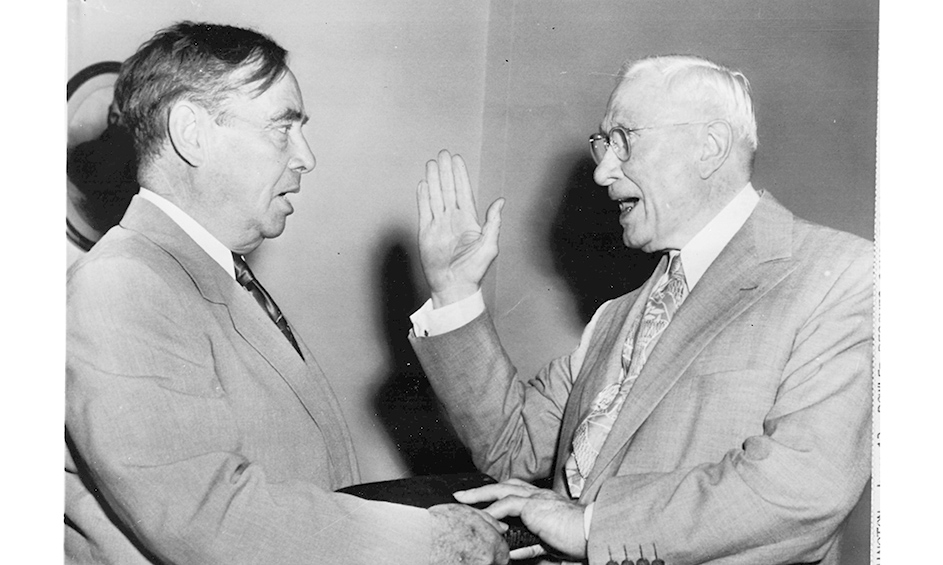By Ray Hill
I am oftentimes asked about Tennessee’s most enduring statesmen or politicians. Without a doubt, the two most enduring political figures in Tennessee’s modern political history are Kenneth D. McKellar and Cordell Hull. McKellar and Hull were contemporaries and colleagues. As men they shared some similarities and of course being distinct individuals, they were quite different in many ways. McKellar was a bachelor his entire life with an appreciation of the fairer sex; Cordell Hull married late in life and seemed devoted to his wife, Frances. McKellar remains Tennessee’s longest-serving U. S. senator and no other Tennessean has served the Volunteer State in Congress longer. Hull holds the record as the longest-serving Secretary of State in our country’s history. Both men, as befitting a Tennessean, were to be reckoned with in a feud. McKellar and Hull had dissimilar personalities and very different approaches to politics and government. Yet both men were able and successful and there was a time when Cordell Hull and Kenneth McKellar were venerated by the people of Tennessee.
Cordell Hull could be punishingly vindictive although he came by it naturally. His father, William “Uncle Billy” Hull was a prosperous merchant and businessman who had been shot in the face by pro-Union bullies during the Civil War. Left for dead, Uncle Billy not only survived but actually hunted down the man who had shot him and killed him after the war was over. Highly industrious, Uncle Billy counted amongst his enterprises a country store, farming, timber and the distilling of illegal whiskey. When Uncle Billy died, he left little or nothing to his surviving sons, save for Cordell. Uncle Billy’s estate was some $200,000, the equivalent to approximately $3,250,000 in today’s dollars. Hull had four brothers: Orestes, Sanadius, Wyoming and Roy.
Kenneth McKellar worked hard as a youngster to get an education and his father was disabled in some way and the siblings pitched in together to care for their mother and themselves. McKellar earned a Phi Beta Kappa key from the University of Alabama and graduated from law school. K. D. McKellar never meant to remain in Memphis; rather he intended to get a railway pass from his brother Robert who worked for a railroad and head toward California and prosperity. Instead, young McKellar found Memphis congenial and he began what became a lucrative law practice.
Cordell Hull was also an attorney, but his real vocation was politics. Hull was elected to the Tennessee House of Representatives in 1892 when he was only twenty-one years old. Hull served two terms and went to Cuba during the Spanish – American War where his ability to play poker earned him a tidy sum. Returning to Tennessee, Hull was a local circuit court judge and was elected to Congress in 1906. Cordell Hull only barely won the nomination that year, but he became an institution inside Tennessee’s Fourth Congressional District. Hull routinely won reelection until 1920.
Kenneth McKellar dabbled in politics and helped to reform the Memphis government while becoming a prosperous attorney. McKellar’s path to Congress was almost accidental. While on a vacation, incumbent congressman George Washington Gordon, a former Confederate general, expired, necessitating a special election. One of McKellar’s brother’s sent a telegram urging him to file as a candidate; McKellar replied he wasn’t interested. A local politico, the apparently aptly named Tom Looney boasted McKellar wouldn’t dare to run against him. The hot-tempered K. D. McKellar promptly wired his brother, instructing him to pay the filing fee and announce his candidacy for Congress. McKellar gave Tom Looney a proper whipping and went to the House of Representatives in 1911. Kenneth McKellar was an established political figure in Memphis and Shelby County well before Edward Hull Crump had consolidated his power base. McKellar proved to be a popular congressman and he had accumulated a nest egg that in today’s dollars would be worth around $7.5 million. Unusual for the time, K. D. McKellar ceased practicing the law and devoted himself entirely to his duties as a congressman.
Likewise, Cordell Hull engaged in no other occupation and while McKellar was quick-tempered, Hull’s own anger was quite formidable, usually after coming to a slow boil. Once it began to boil, it became incandescent. Cordell Hull went to great lengths to slay a political enemy and his dislike and disdain for his subordinate as Secretary of State, Sumner Welles, knew no bounds and it would destroy the latter’s career in the State Department.
Kenneth McKellar could make a speech, but he was also an active legislator who could pass bills, especially those which benefitted the people he represented. Once in office, McKellar began the genesis of the constituent service that kept him in office for forty-two years. No problem was too big or too small to merit McKellar’s personal attention and he went after things for Tennessee and Tennesseans with the determination of a terrier with a bone. K. D. McKellar was plain-spoken, oftentimes to the point of being blunt. McKellar never hesitated to tell a constituent he disagreed with his or her point of view. Cordell Hull was far more cautious a politician than Kenneth McKellar. Hull’s extreme caution was something of a running joke with friends and colleagues. Jim Farley, Franklin Roosevelt’s Postmaster General and Chairman of the Democratic National Committee, as well as chief dispenser of federal patronage, wrote he was traveling on a train with Hull and pointed to a herd of sheep on a distant mountainside. “Those sheep appeared to have been sheared,” Farley noted. Hull glanced up and replied, “Yes, at least on this side.”
Hull served on the powerful Ways and Means Committee of the House of Representatives and was very interested in taxation. Cordell Hull was the father of the modern income tax, which hurt him not in the least with his constituents of hill folk and farmers. Both McKellar and Hull coveted promotion to the United States Senate and they each had their eyes on the Senate seat held by Luke Lea.
Lea was himself one of the most unusual and colorful characters in Tennessee’s political history. A publishing magnate who owned the Nashville Tennessean, Lea had been active in helping, at least according to his critics, to almost destroying Tennessee’s Democratic Party. Following the murder of former U. S. senator and recent gubernatorial candidate (and newspaperman) Edward Ward Carmack in a gun battle on the streets of Nashville, a firestorm swept the state and became even more intense when Governor Malcolm Rice Patterson, Carmack’s recent opponent, pardoned one of the dead former senator’s attackers. The end result had been an alliance between Republicans and “Independent” Democrats who practically took over the state for a period of about four years. Ben W. Hooper, a Republican, defeated U. S. senator Robert Love Taylor, a legendary figure in Tennessee’s politics, after Taylor had reluctantly accepted the Democratic nomination after Patterson had been forced to relinquish it. In short order, the same combination of fusionists replaced Senator James B. Frazier in the United States with Luke Lea. Two years later, Hooper was reelected governor by the same combine over Democratic warhorse and former governor Benton McMillin. John Knight Shields, Chief Justice of the Tennessee State Supreme Court and an Independent Democrat, was elected to fill Tennessee’s other Senate seat.
Luke Lea spent little time in Washington and was far more interested in meddling in virtually every aspect of politics inside the Volunteer State. Lea seemed to be unable to help himself from involving himself in anything and everything political, leaving a good many freshly made enemies in his wake. One such enemy was congressman Cordell Hull. Hull’s mode of political murder could be best described as like that of a killer shark, deadly while swift and silent until the teeth sank into soft flesh. It was Cordell Hull who concocted a proposal to hold Tennessee’s first binding primary election for the United States Senate a year in advance of the general election. After a skirmish before the Democratic State Executive Committee, it was decided Tennessee Democrats would select their nominee in an election in November of 1915, followed by a run-off election between the two top vote-getters a month later.
Quite a few members of Tennessee’s delegation in the House of Representatives liked the idea of moving up to the Senate. Cordell Hull, Finis Garrett, Thetus W. Sims, Joseph W. Byrns and Kenneth McKellar were all discussed as candidates. While Hull had engineered moving up the primary, ever cautious, he shied away from the prospect of a risky statewide race, especially after former governor Malcolm Patterson declared he was running against Senator Lea. McKellar became the third entrant in the primary following the announcement and withdrawal of Congressman Sims. Patterson and Lea were both wildly polarizing figures inside and outside the Democratic Party. Neither the senator nor the former governor paid much attention to McKellar, preferring to bitterly assail one another. Congressman McKellar was quietly moving around the state, collecting promises of support. McKellar presented himself as the “harmony” candidate and the only Democrat who could beat the GOP nominee, former governor Ben W. Hooper. Cordell Hull, who loathed Luke Lea, compared him to the corrupt and lying Ananias of the Bible who was stricken dead for having dared to lie to God Himself. Hull supported McKellar, who won the first primary. Lea ran a poor third with former governor Malcolm Patterson only narrowly trailing the Memphis congressman. The run-off election was anti-climactic with K. D. McKellar carrying every grand division of the state and defeating Patterson soundly. For the next thirty-six years, Kenneth McKellar remained in the United States Senate.
Cordell Hull’s sense of caution did not protect him when he got on the wrong side of the womenfolk. Hull took the position that the federal government had no role to play in giving women the right to vote in all elections. Senator McKellar, on the other hand, was an enthusiastic and important supporter of giving women the right to vote, nationally and in Tennessee. McKellar lobbied the legislature hard in an intense fight in the Tennessee General Assembly when the Volunteer State became the final state to approve the Nineteenth Amendment. Hull faced a tidal wave of Republican votes in the 1920 election, even in the solidly Democratic Fourth District. Cordell Hull narrowly lost his seat to Wynne F. Clouse. Hull became Chairman of the Democratic National Committee, although he remained determined to avenge the only electoral defeat of his career. Cordell Hull returned to Congress in 1922.
Senator McKellar became an oftentimes caustic critic of the Republican administrations during the decade of the 1920s. McKellar was especially critical of President Herbert Hoover and Andrew Mellon, the immensely rich Secretary of the Treasury during the administrations of Warren G. Harding, Calvin Coolidge and Hoover. While recent historians have derided and dismissed McKellar as a reactionary and ultra-conservative, the senator was described by no less than the New York Times as a “militant progressive.” One newspaper in Columbia, Tennessee declared Senator McKellar was a socialist.
McKellar’s brand of constituent service stood him in good stead through the years in election contests and he became unbeatable. The senator swept aside a free-spending opponent in the Democratic primary and a legitimate Republican candidate in the general election. McKellar faced a formidable opponent in the 1928 Democratic primary in the person of Congressman Finis Garrett, who was the leader of the Democrats in the House of Representatives. Garrett was highly articulate, quite intelligent, and profoundly conservative. Garrett’s candidacy was thought to be a very real threat to McKellar’s continued tenure in the Senate as they both hailed from West Tennessee. Senator McKellar’s insistence upon telling his constituents the truth, as well as his excellent constituent service, helped him to carry every section of the state and beat Garrett soundly. Kenneth D. McKellar had established himself as a genuine political power in Tennessee as Cordell Hull prepared to take the leap to the United States Senate.






